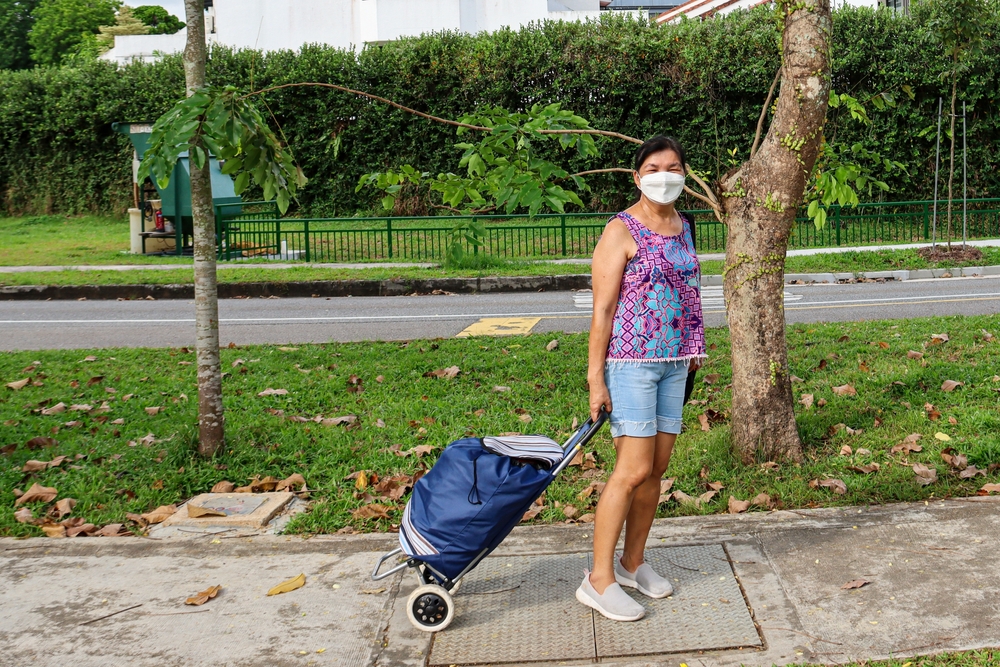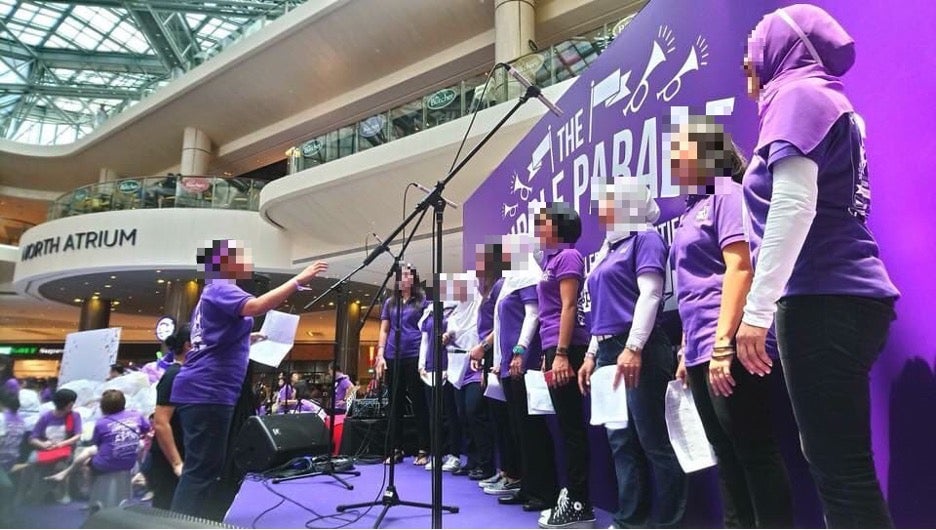Stories of domestic workers caring for the elderly under lockdown

Introduction
In May 2021, I arrived back in Singapore to conduct fieldwork for my doctoral dissertation. As a graduate student researcher whose plans were interrupted to say the least, I soon realised that my fieldwork anxieties during Covid-19 could hardly compare to that of my informants during lockdown. Indeed, I have been relatively lucky to have had a good number of enthusiastic informants respond to my calls for interview requests in online communities despite their own uncertainties.
My fieldwork notes will outline the main takeaways from interviews with seven Foreign Domestic Workers (FDWs) thus far. The youngest of the informants was in her mid-20s while the oldest was in her early 50s, with the rest evenly spread between their late 30s to mid-40s. Five were from the Philippines and two from Indonesia. All had been working in Singapore for at least five years with the longest having stayed here for 17 years.
As much as possible, I analysed the interview transcripts as they are, by treating them as sources for triangulation. In the following analysis, I elaborate on a few main themes surrounding caregiving work and the suggestions made by FDWs.
Caring for the elderly is difficult yet remains underappreciated by employers
My informants’ stories predominantly revolved around the sheer difficulty of eldercare work, which consisted of both ‘hard’ and ‘soft’ aspects corresponding to caregiving techniques and emotional resilience respectively. At the same time, a majority felt that their employers had been rather unsupportive in acknowledging the emotional labour required to successfully perform their task.
Two informants were caring for elderly dementia patients who required help with their activities of daily living (ADL), and had previously undergone caregiver training courses to master techniques like wheelchair transferring and patient lifting. For them, situations of unreasonable behaviour included being scalded by hot water, not being allowed to cook their own meals and having their showers interrupted. In one case, an elderly woman refused to consume food at home and would only eat when dining out despite having a leg injury.
When this informant asked her employer’s adult children for assistance, they simply told her to ‘give Panadol’' and to continue taking her out daily despite the obvious risks particularly during the pandemic.
Contrary to the mainstream tendency to perceive care work merely as ‘dirty’ work, my informants stressed that the degree of patience required was beyond imagination, and was a hard-earned spiritual quality that employers themselves did not seem to possess.
Caregiver professionalism is an important work ethic to FDWs
My informants exhibited a distinct sense of caregiver professionalism, or what they felt were hallmarks of a competent caregiver that they were themselves responsible for cultivating. Overall, they felt that taking the initiative to seek out online resources for caregiver courses and to maximise their training opportunities to obtain new knowledge was crucial to maintaining a professional work ethic.
All informants referred to the need to actively seek out gaps in the day to attend caregiver courses and to search for community classes with flexible schedules. Although some were lucky enough to have supportive employers, those who did not nonetheless strived to carve out the flexibility to learn about caregiver techniques.
Two informants noted the lack of training and credential requirements that made them anxious about their ability to provide reassuring care for their elderly ward. One had told her employer that without the training, ‘I cannot give you assurance that your mother is safe and I am safe’. Although her employer remains uninterested in the idea of her going out to attend classes, she makes do with these constraints by attending free webinars, doing online research, or speaking to experienced caregivers in the FDW community support groups.
Caregiver professionalism consists of ‘hard’ and ‘soft’ aspects
When discussing their training and working experiences, it was evident that caregiver professionalism embodied ‘hard’ aspects like techniques/skills and ‘soft’ aspects like patience/understanding.
It was extremely common for placement agencies to downplay the caregiver credentials of trainees or even bluff their way through to employers looking for experienced caregivers, claiming that FDWs are well prepared. A majority of those I interviewed realised upon the commencement of their first job, that they were unable to comfortably perform tasks like giving injections, inserting catheters and lifting the elderly during wheelchair transfer. Indeed, the lack of caregiver techniques was an area that FDWs cared more about than employment agents. One explained that she would ‘ask as many questions as possible’ to understand the elderly client’s care needs before the first deployment as a way to offset the ‘shock’. As outlined above, my informants strived to achieve mastery of caregiver techniques within their employment constraints.
During the interviews, I observed that my informants spent way more time in sharing their stories of cultivating the softer skills of performing emotional labour as a caregiver. While the care needs of their elderly wards varied, the two values of patience and understanding were applicable across the board when it came to interacting appropriately and professionally with their elderly ward, despite verbal abuse or unreasonable behaviour.
Two informants expressed that they imagined themselves in the elderly’s shoes, concluding that they too were not having it easy. One observed that her elderly charge felt insecure and perpetually lonely, especially because she had lost regular contact with her children: ‘they just want somebody to listen to them, to accompany them, and more like you must be the one to understand because I think for them, they think that nobody understand them’. She also explained that the previously independent elderly might experience psychological insecurities as they suddenly find themselves losing control over basic bodily functions, and having to physically rely on strangers to manage day-to-day activities.
Others adopted a separate framework to rationalise the unpredictable tantrums of elderly patients, especially those with dementia or psychological issues that resulted in attention-seeking tendencies. As the logic goes, the condition of dementia is itself a reason to pardon their random tantrums because ‘they are sick already’, ‘they are patients so it doesn’t matter’. These stories suggest that for my informants, caregiver professionalism does rest on a basic component of technical expertise, but more importantly, having the spiritual resilience and ‘heart for the job’ was the most indispensable component.
Caregiver attachment to the elderly: Care work is ‘not just [about] the money’
My informants said that although it is true that their migration to Singapore was primarily due to financial pressure in their hometowns, the caregiver attachment – inevitable in their eyes – that develops as they spend more time with their elderly ward means that caregiving work does not deserve the ‘dirty’ reputation it has in society.
One informant stated that FDWs are well aware of the fact that ‘we are here to work’, and that financial provision for their family members was undeniably the main driver of their migration. Still, a number of them had or have been delaying the opportunity to switch to new employers who offered higher salaries, or the chance to shift into a non-domestic sector because they could not bear to leave their current elderly ward. One such informant who was caring for an elderly woman in her 90s said ‘because for me hah, when I get attached to the person even though you treat me badly but then, when I get attached with you right, very difficult for me to leave you, you know...I’m most precious for the bonding time, you know the moment with you, how I treat you how you treat me, you know?’
Another described her feelings of attachment as such: ‘We work for money but that is not really the only thing as the time goes by while you working, you will have that feeling, you know that feeling for the elderly because you can see that um, they’re quite fragile also, is like they’re lonely, so you can you know, you’re working not just only for money but also you look at them as your family.’ These statements show that care work comes with tremendous emotional demands on FDWs that do not correspond neatly with economic logic of the migrant worker, because their heart is in their work.
Yet another informant explained that it was impossible to see eldercare as just about the salary, contrary to what her employer – the elderly ward’s child – thought. She shared that it was common in her experience for employers to have a sense of entitlement over the FDW once she enters the home. From an employer’s perspective, the monthly wage paid has resulted in the caregiver’s presence in the house and the expectation of them being continuously on call. Although the wage was her main motivation, there were also affective components that were unamenable to transactional logic.
If I am going to write about our interview, what do you want me to say?
The first suggestion was that weekly off days should be made a legal requirement. Although a new weekly day off policy was implemented in 2013, its enforcement remains up to the discretion of private placement agencies, many of which require trainees to accept little to no off days as per employers’ demand. Domestic employers are also given the option to offer compensation in lieu (typically $15-20 a day) in exchange for a day off which FDWs may find hard to refuse. FDWs were keenly aware of the informal loopholes in private agencies that allow employers to wield an absolute bargaining power.
Having rest days are essential for the psychological wellbeing of caregivers, given the mentally exhausting nature of eldercare. Although MOM has recently announced a new legislation (effective end 2022) for a compulsory one day off per month that cannot be bought off, there remains the issue of an unequal bargaining power between employer and employee. One informant mentioned that the recent Ministry of Manpower (MOM) home visit initiative was a welcome move and should be made more extensive, since this is likely to increase the detection of rights violation by employers.

The second suggestion was for more employer support and understanding for the FDWs to attend training courses since this will hugely benefit both the caregiver and recipient. The lack of adequate care training prior to their deployment as pointed out by a few informants is concerning, as many realised only upon employment that they were not equipped with both the hard (caregiving technicalities) and soft skills (maintaining a calm composure) required to comfortably handle their elderly clients.
About half mentioned that having the flexibility to go for skills training courses during the day (which many employers are reluctant to approve) would help with handling unexpected incidents like falls and minor injuries. Notably, the ability to maintain a calm composure and react efficiently was an area that many wanted more practice in. In some cases, FDWs were unable to attend skills classes freely because employers did not see the real need for these, and were unwilling to make flexible time arrangements because the courses ran during the day.

Since the pandemic’s onset, local NGOs have reported a dramatic spike in abuse and runaway cases among FDWs, attesting to their heightened vulnerabilities during lockdown. Many no longer enjoy day offs and are subject to additional accumulated stresses in the employer’s household as the population transitions to work-from-home arrangements. In that regard, the third suggestion from my informants was actually to increase the availability and accessibility of community advisory/counselling networks for FDWs.
One informant who carries psychological trauma recalls that during the two months in her first employer’s household, “I really got depression, ya really depression”. Although she has since moved on to numerous good employment experiences, she says that given that it is fairly common for newcomer FDWs to be in abusive or exploitative situations, special attention is needed to check in on this group in the early stages of employment. More counselling services for FDWs would go a long way for those with past abuse experience to settle into new employer households. She notes that while the Singaporean caregiver community has a considerable network of online communities and support groups in the heartland centres, the FDW community does not have a comparable one.
Conclusion
Overall, my informants are keenly aware of their peripheral status in the community, yet demonstrate a remarkable sense of caregiver professionalism that deserves more room for development. The eldercare sector would do well to pay heed to their suggestions for improving the quality of care offered to seniors, starting from stronger enforcements of good labour practices for domestic work.
The views expressed in this forum are those of the individual authors and do not represent the views of the Asia Research Institute, National University of Singapore, or the institutions to which the authors are attached.









